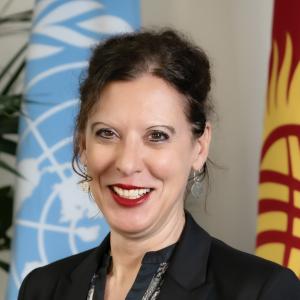Excellencies,
Dear spiritual leaders, representatives of religious organizations, academia and civil society,
Ladies and Gentlemen,
On behalf of the United Nations system in the Kyrgyz Republic, it is an immense honour to participate in today’s International Conference, devoted to the theme of interfaith harmony and peace in Kyrgyzstan.
This conference could not be more timely. Today, the world is seeing the highest number of violent conflicts since 1945, with one quarter of humanity estimated to live in places affected by conflict, causing untold suffering to millions. The world is deeply divided and increasing polarization among and between societies make harmony and peace a distant aspiration, challenging social peace and cohesion. The wars in Ukraine and in the Middle East are not only undermining international law, but raise serious questions as ot the state of humanity as such. In such complex times, we see that many global and regional challenges can be linked to or manipulate religious factors.
Therefore, it is more important than ever to gather for dialogues such as today’s that seek to foster mutual understanding and to remind ourselves of the value of peace, which is at the heart of all religions as well as the United Nations Charter that was adopted 78 years ago with the promise “to save succeeding generations from the scourge of war”.
At the United Nations, we firmly believe that peace is not just the absence of violent conflict. Peace is a dynamic and transformative force that requires the constant engagement of the State as well as the whole of society, through all its voices. It requires the acknowledgement of diversity and plurality of views and a constant recommitment of all members of society to tackle today’s challenges peacefully, with respect for said plurality and diversity, be it political, ethnical, religious, cultural or gender-related].
Ladies and Gentlemen,
In the current context, participatory and inclusive approaches have become even more important to foster a common sense of civic identity with a view to building bridges and overcome divides.
Equally, the promotion of social cohesion in a diverse society that is built on the respect for minority rights and the principles of self-identification and tolerance and that considers ethnic, linguistic, religious, cultural and gender diversity a richness that needs to be cultivated to sustain peaceful, inclusive and stable societies, is crucial.
Distinguished guests,
In these challenging times for our world, it is our collective responsibility to help build a world of peace, sustainable development and human rights for all; to expand opportunities, especially for youth; to ensure justice, equality and empowerment for women and girls; and to leave no one behind.
Global leaders came together in September at the Summit on the Sustainable Development Goals (SDGs) in New York to reaffirm their commitment to a more just, equitable and sustainable world. The SDGs are a solemn promise of shared responsibility to future generations and a firm commitment to a brighter tomorrow, despite the challenges we face.
At the Summit, President Japarov acknowledged the need to focus on poverty alleviation and reduction of socio-economic inequalities. He stressed that it was essential to strengthen social safety based on equity and inclusion, to reverse poverty – essential not only for sustainable development, but also the foundation for a harmonious and peaceful society.
This was an important milestone in preparation for the pivotal Summit for the Future which will bring together world leaders next year in the margins of the 79th UN General Assembly to tackle the most pressing global challenges and renew their commitment to multilateralism and international cooperation.
The Secretary-General has put on the table a set of ambitious proposals, to be agreed inter-governmentally, designed to address global inequality and achieve the SDGs, improve the UN and global governance, prepare for the challenges to come, and ultimately restore trust in a divided world.
They will make up a Pact for the Future, to spur action toward a fair and just global financial system, a safe, peaceful and sustainable planet, technology at the service of humanity, and decision-making that safeguards future generations.
One chapter of the Pact for the Future will be dedicated to peace and security. To give an impetus for a global discussion, the Secretary-General has put forward a New Agenda for Peace. At its core is the concept of proactively preventing conflicts and fostering peace. It underscores the necessity for all UN Member States to formulate prevention strategies to curtail the escalation of existing threats to peace, and outlines measures various partners can take to avert violent conflicts. Member States have been encouraged by the Secretary-General to develop such prevention strategies, where they do not yet exist, as part of the preparations for the Summit of the Future.
Ladies and Gentlemen,
Today, I look forward to the discussion of the roles and contributions of a variety of actors in society towards peacebuilding to counter hate, build bridges and promote harmony, and to your contributions to next year’s Summit and the Agenda for Peace. The role in this regard of religious and spiritual leaders and communities cannot be over-estimated.
Let me conclude with the words of the UN Secretary-General: “It is our responsibility to help build a world of peace, sustainable development and human rights for all. […]”.
Thank you!


